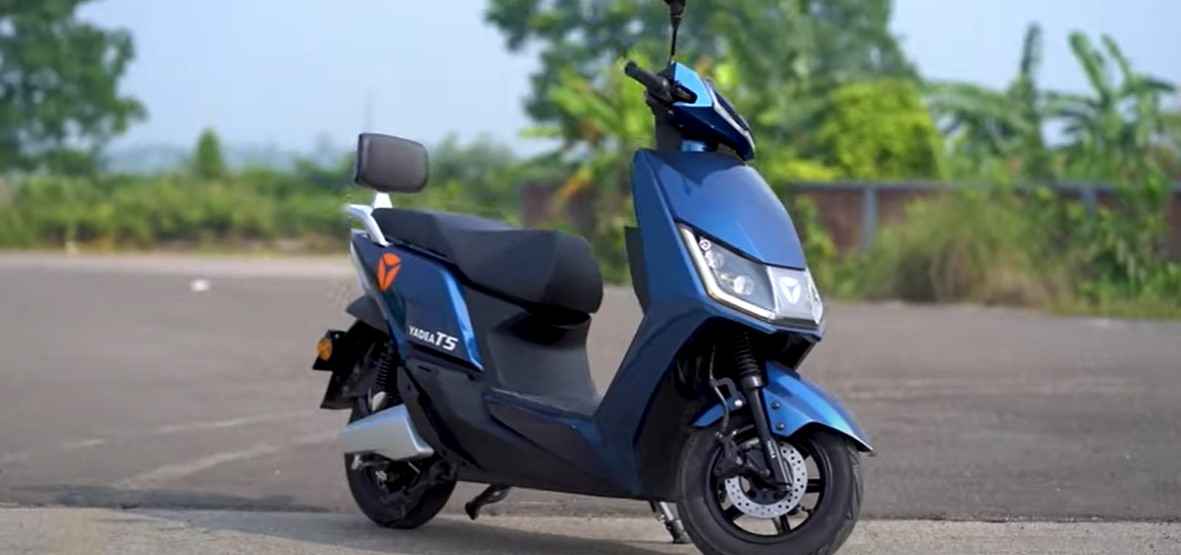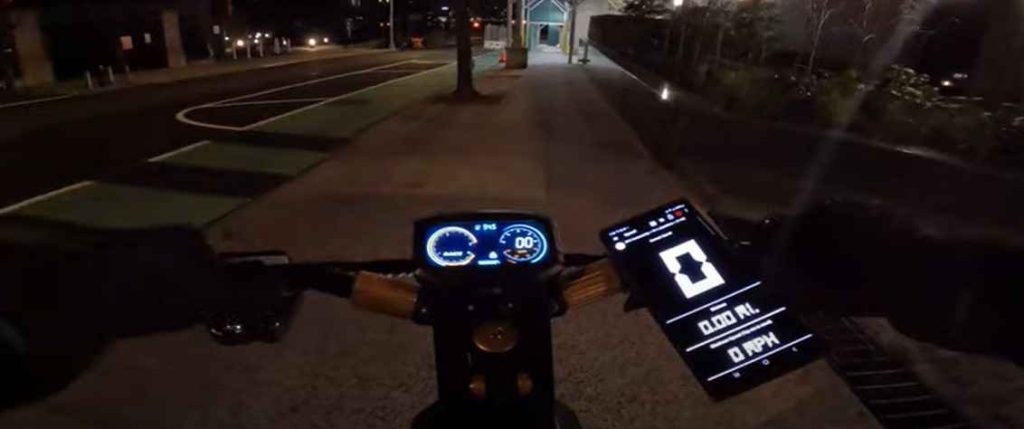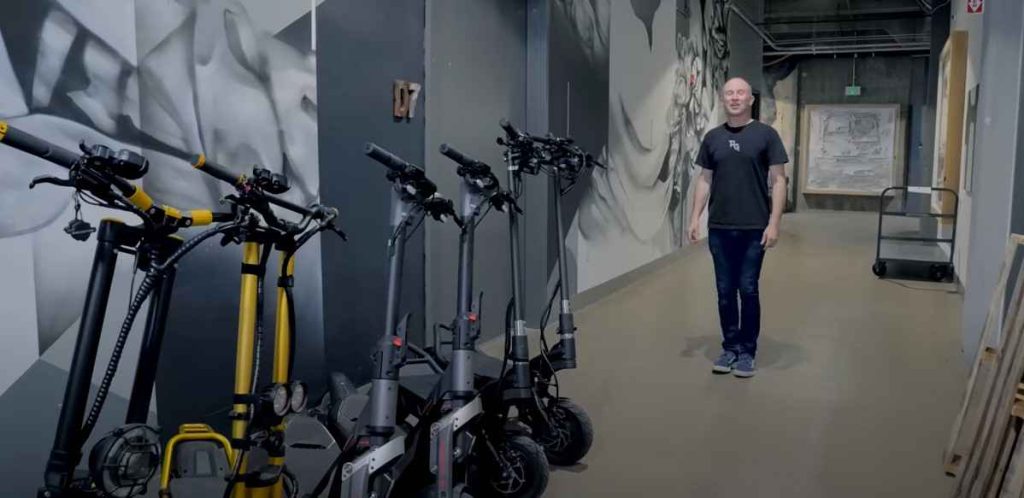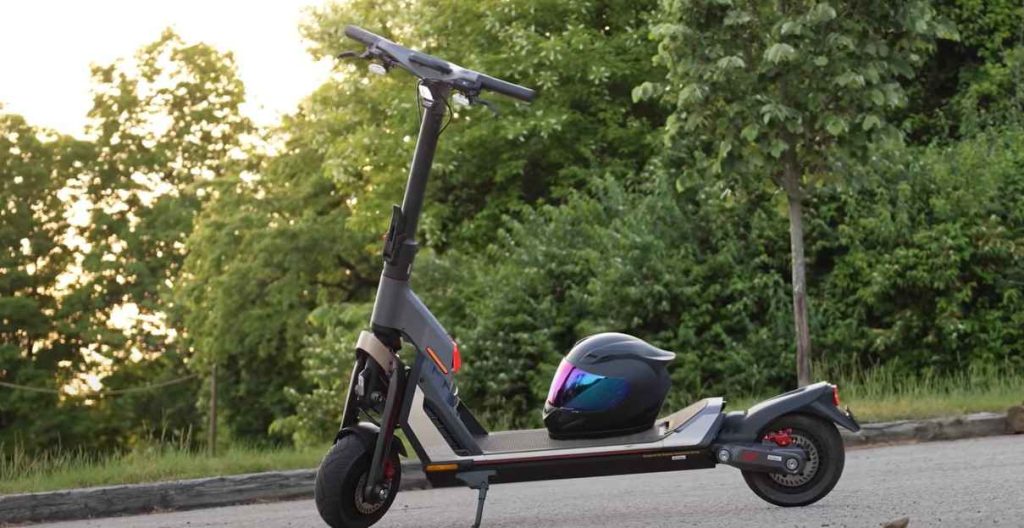If You know “How Far Can Electric Scooter Travel?”. It knows it , then You could a decide for travel using electric scooter.
An electric scooter can typically travel between 10 to 40 miles on a full charge. Distances vary based on the scooter model and battery capacity.
Electric scooters have surged in popularity, offering a convenient and eco-friendly mode of transportation suited for urban environments. They are ideal for short commutes, quick errands, and zipping through city streets without the hassle of traffic jams or parking issues.
With advancements in battery technology, the travel range of electric scooters is continually improving, catering to a wider market. Riders must consider battery life, motor power, and terrain factors affecting the distance an electric scooter can cover.
As personal transporters, these scooters not only reduce carbon footprints but also cut down on transportation costs.
Electric scooters are reshaping urban mobility, with their travel distance being a pivotal feature influencing consumer decisions.
Table of Contents
ToggleElectric Scooters: The Quest For Distance
The distance an electric scooter can travel shapes its value to riders. As electric scooters surge in popularity, understanding their range becomes critical. Let’s uncover the mysteries behind how far these nifty vehicles can take us.

The Importance Of Range
Imagine planning your journey with confidence, knowing your electric scooter won’t quit halfway. Range is pivotal. It dictates whether your scooter is just for short errands or if it can handle your entire commute. Let’s look into what makes scooter range so essential.
- Commuting: A longer range means fewer charges, making electric scooters a reliable travel buddy for longer trips.
- Exploration: With a capable range, adventurous riders can explore more without range anxiety.
- Convenience: Scooters with high range bring greater freedom, reducing the need to locate charging stations frequently.
Factors Impacting Travel Distance
Many elements affect how far an electric scooter can travel. Each factor plays a unique role in the scooter’s range capability. Let’s examine them closely.
| Factor | Impact |
|---|---|
| Battery Capacity | The bigger the battery, the longer the distance your scooter can cover. |
| Rider Weight | Heavier loads may reduce the range. |
| Terrain | Hills and rough surfaces can drain the battery faster, shortening the range. |
| Speed | Riding at top speed consumes more energy, leading to a decreased range. |
| Weather Conditions | Cold or hot weather can affect the battery performance and scooter range. |
These factors helps riders make the best choices for their needs. Choose wisely to enjoy a vast scooter range on every ride.
Battery Technology And Scooter Range
Electronic scooters are zipping through streets worldwide. Their range depends on battery power. Different batteries helps you choose the right scooter. This section explores types of batteries and their advancements.
Types Of Batteries Used
Two main batteries power electric scooters: Lead-Acid and Lithium-Ion. Let’s compare them:
| Battery Type | Pros | Cons | Common in… |
|---|---|---|---|
| Lead-Acid | Cheaper, reliable | Heavier, slower charge | Entry-level scooters |
| Lithium-Ion | Lighter, quick charge | Costlier | High-end scooters |
Lithium-Ion batteries lead the pack in range and efficiency.
Advancements In Battery Life
- Increased Energy Density: Scooters travel farther on a single charge.
- Fast Charging Tech: Less waiting, more riding.
- Better Battery Management: Systems protect and prolong battery life.
- Recovering Energy: Braking turns into extra miles.
Better batteries mean longer journeys. Keep an eye on watt-hours (Wh) for a measure of scooter range.
Measuring Scooter Performance

The performance of an electric scooter heavily hinges on its range. Riders prioritize understanding how far their electric scooter can travel on a single charge. This key metric is not only about maximum distance but also about reliability, efficiency, and convenience.
Different factors such as rider weight, terrain, speed, and battery health all play roles in an electric scooter’s travel capacity.
Range Testing Standards
To provide consumers with consistent data, manufacturers adhere to specific range testing standards. These standards ensure that range claims are based on specific conditions. Let’s explore the methods used:
- Controlled Environment Tests: Scooters undergo range tests under ideal conditions, which might not reflect real-world usage.
- Dynamic Testing Procedures: These are designed to mimic varied conditions, including stops and starts, different speeds, and varied terrains.
Standard Test Cycles: These are formalized tests, like the Urban Cycle test. They take into account average urban commuting conditions to approximate real-world performance.
Real-world Performance Vs. Claims
Manufacturer Claims: While brands may state a maximum range for their scooters, actual performance can vary. Battery age and ambient temperature can affect these claims significantly.
Rider Experience: Many riders perform their own tests, recording their experiences and sharing them with the community. These real-world insights offer valuable, practical information for potential buyers.
Factors Affecting Range: Consider elements that influence electric scooter range:
| Factor | Impact on Range |
|---|---|
| Rider Weight | Heavier weights may decrease range. |
| Terrain Type | Hills and rough surfaces require more power. |
| Speed | Higher speeds consume battery faster. |
| Battery Health | Older batteries may not hold charge as well. |
These variances can help set realistic expectations. This knowledge is necessary for choosing the right electric scooter for individual needs.
Maximizing Your Scooter’s Range

Electric scooters are taking over city streets, offering a fun and eco-friendly way to travel. But one common question riders ask is, “How far can my electric scooter go?” To squeeze the most distance out of every charge, maximizing your scooter’s range is key.
By adopting smarter riding habits and maintaining your scooter well, longer journeys become possible.
Riding Habits
To extend your electric scooter’s travel distance, consider these tips:
- Start slow: Gentle acceleration consumes less power.
- Keep a steady pace: Consistent speed uses battery efficiently.
- Avoid frequent stops: Constant stop-and-go drains the battery faster.
- Cruise control: Use it if your scooter has this feature.
- Plan routes: Opt for smooth, flat paths over hilly terrain.
Maintenance Tips
Proper maintenance can also help maximize your scooter’s range:
- Regular check-ups: Look for any loose parts or damages.
- Keep it clean: Dirt and debris can add drag.
- Tire pressure: Always inflate tires to the recommended level.
- Battery care: Charge your scooter’s battery as directed.
- Storage: Keep your scooter in a dry, temperature-controlled area.
Top Long-range Electric Scooters In The Market

Start on an extended journey with an electric scooter is now a thrilling reality. With batteries more powerful than ever, riders enjoy significant distances on a single charge. Discover the finest long-range electric scooters that merge distance with durability, speed, and comfort.
Model Comparisons
As we explore the leading models, let’s compare their distance capabilities:
| Model Name | Maximum Range (miles) | Top Speed (mph) |
|---|---|---|
| EcoReco M5 Electric Scooter | 20 | 20 |
| Segway Ninebot MAX | 40 | 18.6 |
| Dualtron Thunder | 75 | 50 |
| Xiaomi Mi M365 | 18.6 | 15.5 |
Features For Enhanced Range
The best scooters for long distances boast specific features:
- High-Capacity Batteries: Major range boosters, they ensure lengthy trips.
- Energy Recovery Systems: They transform braking energy back into power.
- Eco Modes: Optimize battery usage, supporting prolonged travel.
Off-road capabilities and tire design also contribute to distance. Some models excel with tires built for rough terrain, ensuring no adventure is too far.
- Check the battery specs to understand range efficiency.
- Consider models with multiple speed settings.
- Look for scooters with energy recovery features.
Today’s electric scooters are revolutionizing transportation. Suitable for various needs, they offer an eco-friendly, cost-efficient way to travel far distances. Choose the right model to match your range requirements and take the step towards sustainable mobility.
Impact Of Terrain And Rider Weight

The distance electric scooters can travel doesn’t depend only on the battery. Terrain and rider weight play a big role. Let’s dive into how these factors affect scooter travel range.
The Effect Of Uphill Routes
Electric scooters face a challenge going uphill. Steep inclines drain batteries faster than flat roads. Here’s why:
- More power needed to climb
- Wheels work harder against gravity
- Battery depletes quicker on slopes
For scooters to reach their max range, avoiding constant uphill routes is key.
Weight Limits And Efficiency
Rider weight also affects how far electric scooters can go. Here are the facts:
| Weight Class | Efficiency |
|---|---|
| Lighter Riders | Better efficiency, longer range |
| Heavier Riders | Reduced efficiency, shorter range |
Manufacturers provide weight limits for the best performance. Staying within these limits ensures your scooter travels the farthest.
Environmental Influences On Scooter Travel
Environmental Influences on Scooter Travel significantly impact how far an electric scooter can go. It is not just about the battery or motor; the world around us plays a huge role in this aspect of scooter performance. Let’s explore how weather conditions and seasonal variations can affect your scooter’s range.
Weather Conditions
Electric scooters, like many electronic devices, are sensitive to the whims of weather. Rain, wind, and extreme temperatures can lead to a decrease in travel distance. Here’s a list of how different weather conditions can affect your ride:
- Rain can make roads slippery, reducing tire traction.
- Wind resistance increases energy use, particularly if riding against strong winds.
- Hot temperatures can cause batteries to overheat, potentially reducing their efficiency.
- Cold weather often decreases battery capacity, leading to a shorter range.
Seasonal Range Variation
Not only does weather affect your scooter’s range, but seasons do as well. Pay attention to these seasonal factors that come into play:
| Season | Factors | Range Impact |
|---|---|---|
| Spring | Possible rain and mild temperatures | Moderate effect |
| Summer | High temperatures and longer daylight hours | Can be positive or negative |
| Fall | Cooling temperatures and potential rain | Generally favorable |
| Winter | Colder temps and risk of snow or ice | Often negative |
Understanding these environmental factors can help you maximize your scooter’s range and ensure a lasting ride.
Economic And Ecological Benefits Of Extended Range
Electric scooters are revolutionizing urban mobility. With technological advancements, the range of these scooters keeps increasing. This extended range brings significant economic and ecological benefits. Users can travel further without worrying about frequent recharging.
Let’s delve into the two most advantages: cost savings and a reduced carbon footprint.
Cost Savings In The Long Run
Extended range electric scooters have become a viable alternative to cars for daily commutes. Over time, they save users money on fuel, maintenance, and parking. A detailed cost comparison shows the clear financial edge these scooters offer.
- Lower electric charge vs. gas prices
- Minimal maintenance required
- No parking fees in many urban areas
For instance, covering 500 miles a month on an electric scooter might cost under $5 in electricity. Comparatively, a car could cost around $60, considering current gas prices. This translates to sizable savings across a year.
| Transport Mode | Monthly Cost | Yearly Savings |
|---|---|---|
| Electric Scooter | $5 | $660 |
| Car | $60 | $0 |
Reduced Carbon Footprint
Electric scooters offer a green way to travel. They reduce greenhouse gas emissions compared to conventional vehicles. Every mile traveled on an electric scooter lessens the carbon footprint.
A 10-mile journey can emit about 4.6 pounds of CO2 when taken by car. The same trip on an electric scooter contributes far less to air pollution. The table below highlights the difference in emissions.
| Transport Mode | CO2 Emission per 10 Miles |
|---|---|
| Electric Scooter | 0.6 pounds |
| Car | 4.6 pounds |
Choosing an electric scooter over a car for short-distance travel makes a real difference. By doing so, each user contributes to a healthier planet.
The Future Of Electric Scooter Travel

The future beams bright for electric scooter travel. Imagine whisking through the city, breeze brushing your face, and your ride persisting way beyond the last bus stop. Advances in technology promise longer trips with zero emissions. Let’s scoot into what tomorrow holds for electric scooters.
Innovations On The Horizon
Thrilling leaps in battery technology and design await riders. Engineers craft lighter materials and sleeker scooters. These changes mean less weight and more travel distance. Look out for these advancements:
- Solid-state batteries: More power in a compact size
- Energy recovery systems: Brakes that charge your ride
- Solar panels: Scooters sip sunshine for extra miles
- Smart integration: Apps that map out energy-efficient routes
Predictions For Range Extension
How far will scooters go? Experts foresee a future where you can glide over hills and dales, not just city blocks. Range limits are set to extend dramatically.
| Current Average Range | Future Predictions |
|---|---|
| 15-20 miles | 50+ miles |
With these predictions, riders dream of inter-city journeys. An electric scooter could take you from home to work to play. All with a single charge.
Frequently Asked Questions Of How Far Can electric scooter travel
Can Electric Scooter Go A Long Distance?
Electric scooters can cover long distances, with some models capable of traveling over 60 miles on a single charge. Factors such as battery capacity, terrain, and riding style can affect range.
How Far Will An Electric Scooter Go On A Full Charge?
An electric scooter can typically travel between 10 to 40 miles on a full charge, depending on the model and battery capacity. Factors like rider weight and terrain also influence range.
What Is The Range Of An Electric Scooter?
The range of an electric scooter typically varies between 10 to 40 miles, influenced by battery size, terrain, and rider weight.
What Is The Travel Range Of An Electric Scooter?
The travel range of an electric scooter typically varies from 10 to 40 miles, depending on the model and battery capacity. Factors like rider weight and terrain also impact the range.
Are Electric Scooters The Future?
Electric scooters are gaining prominence as a crucial element in the future of urban mobility, providing a sustainable and efficient solution for short-distance commuting. As cities pursue eco-friendly electric scooters indicates their potential to play a major role in shaping urban transportation in the future.”
Conclusion
The limits of electric scooter range is key to maximizing your travel. Optimal battery care and mindful usage can extend journeys significantly. Always consider manufacturer specs and real-world reviews for the best insight. Maintain the eco-friendly commute; explore further with confidence in your electric scooter’s capabilities.
Choose wisely and ride on!




